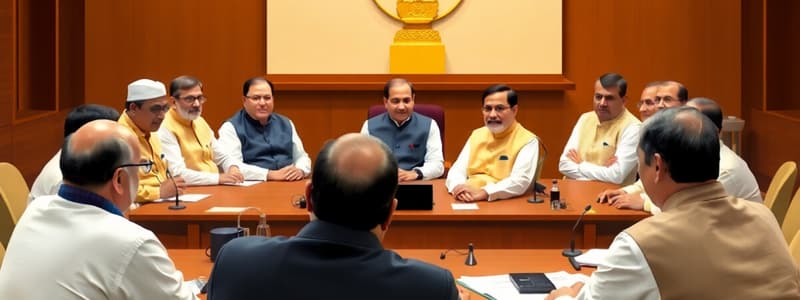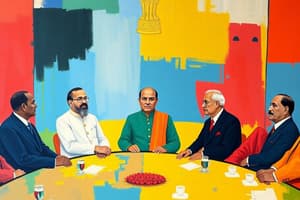Podcast
Questions and Answers
Which committee is often referred to as a 'Super-Cabinet'?
Which committee is often referred to as a 'Super-Cabinet'?
- Political Affairs Committee (correct)
- Economic Affairs Committee
- Parliamentary Affairs Committee
- Appointments Committee
What is the primary function of the Economic Affairs Committee?
What is the primary function of the Economic Affairs Committee?
- Coordinate foreign policies.
- Oversee government appointments.
- Monitor parliamentary progress.
- Manage economic governmental activities. (correct)
Which committee is chaired by the Home Minister?
Which committee is chaired by the Home Minister?
- Appointments Committee
- Economic Affairs Committee
- Political Affairs Committee
- Parliamentary Affairs Committee (correct)
What is the primary role of the Council of Ministers in relation to the President?
What is the primary role of the Council of Ministers in relation to the President?
What was one observation made by the Second Administrative Reforms Commission concerning the Groups of Ministers (GoMs)?
What was one observation made by the Second Administrative Reforms Commission concerning the Groups of Ministers (GoMs)?
What did the Second Administrative Reforms Commission recommend for the operation of GoMs?
What did the Second Administrative Reforms Commission recommend for the operation of GoMs?
Which Article of the Constitution specifies that the Prime Minister shall be appointed by the President?
Which Article of the Constitution specifies that the Prime Minister shall be appointed by the President?
What is the maximum number of ministers in the Council of Ministers, including the Prime Minister?
What is the maximum number of ministers in the Council of Ministers, including the Prime Minister?
Which statement accurately describes the role of Groups of Ministers (GoMs)?
Which statement accurately describes the role of Groups of Ministers (GoMs)?
Which of the following is a condition for a minister who is not a member of Parliament?
Which of the following is a condition for a minister who is not a member of Parliament?
Who administers the oaths of office and secrecy to a minister in India?
Who administers the oaths of office and secrecy to a minister in India?
The disqualification of a member due to defection affects their eligibility to be appointed as?
The disqualification of a member due to defection affects their eligibility to be appointed as?
Which provision ensures the collective responsibility of the Council of Ministers?
Which provision ensures the collective responsibility of the Council of Ministers?
How can the President respond if he disagrees with the advice of the Council of Ministers?
How can the President respond if he disagrees with the advice of the Council of Ministers?
What legislative body determines the salaries and allowances of the ministers?
What legislative body determines the salaries and allowances of the ministers?
What is a key characteristic of the Inner Cabinet or Kitchen Cabinet?
What is a key characteristic of the Inner Cabinet or Kitchen Cabinet?
Which of the following is a noted advantage of the Kitchen Cabinet?
Which of the following is a noted advantage of the Kitchen Cabinet?
What was a significant demerit of the Kitchen Cabinet mentioned?
What was a significant demerit of the Kitchen Cabinet mentioned?
How does the Kitchen Cabinet relate to the overall structure of governance?
How does the Kitchen Cabinet relate to the overall structure of governance?
In which countries, apart from India, does the Kitchen Cabinet phenomenon occur?
In which countries, apart from India, does the Kitchen Cabinet phenomenon occur?
What is a potential risk associated with the existence of a Kitchen Cabinet?
What is a potential risk associated with the existence of a Kitchen Cabinet?
Which of the following statements about the Kitchen Cabinet is true?
Which of the following statements about the Kitchen Cabinet is true?
What term is used to describe the effect of the Inner Cabinet's decisions on the larger cabinet?
What term is used to describe the effect of the Inner Cabinet's decisions on the larger cabinet?
Which of the following best describes the dynamics of the Kitchen Cabinet?
Which of the following best describes the dynamics of the Kitchen Cabinet?
Which power does the Kitchen Cabinet potentially undermine?
Which power does the Kitchen Cabinet potentially undermine?
Which function do Cabinet Committees primarily serve?
Which function do Cabinet Committees primarily serve?
As of 2019, how many Cabinet Committees are functional?
As of 2019, how many Cabinet Committees are functional?
Which of the following Cabinet Committees was present in 1994 but not in 2013?
Which of the following Cabinet Committees was present in 1994 but not in 2013?
What principle is not a basis of the Cabinet Committees?
What principle is not a basis of the Cabinet Committees?
Which Cabinet Committee focuses on national security issues?
Which Cabinet Committee focuses on national security issues?
In 2013, which Cabinet Committee was newly introduced that was not in 1994?
In 2013, which Cabinet Committee was newly introduced that was not in 1994?
Which minister typically presides over a Cabinet Committee when the Prime Minister is a member?
Which minister typically presides over a Cabinet Committee when the Prime Minister is a member?
What is a key characteristic of Cabinet Committees?
What is a key characteristic of Cabinet Committees?
What event prompted Arif Mohammed's resignation?
What event prompted Arif Mohammed's resignation?
Which article establishes the principle of individual responsibility of ministers?
Which article establishes the principle of individual responsibility of ministers?
Which of the following is NOT listed as a Cabinet Committee as of 2019?
Which of the following is NOT listed as a Cabinet Committee as of 2019?
Who has the authority to remove a minister in India?
Who has the authority to remove a minister in India?
What is Dr. B.R. Ambedkar's view on collective responsibility in government?
What is Dr. B.R. Ambedkar's view on collective responsibility in government?
What differentiates the legal responsibility of ministers in India from that in Britain?
What differentiates the legal responsibility of ministers in India from that in Britain?
What roles do cabinet ministers play in the Indian government?
What roles do cabinet ministers play in the Indian government?
Which of the following is true regarding the composition of the council of ministers?
Which of the following is true regarding the composition of the council of ministers?
Which category of ministers ranks highest in the Indian council of ministers?
Which category of ministers ranks highest in the Indian council of ministers?
What is a critical function of the Prime Minister concerning other ministers' performance?
What is a critical function of the Prime Minister concerning other ministers' performance?
What is not a characteristic of the ministerial system in India?
What is not a characteristic of the ministerial system in India?
Study Notes
Council of Ministers
- The Council of Ministers is the real executive authority in India's parliamentary system of government, modelled after the British system.
- The Prime Minister heads the Council of Ministers.
- The Constitution outlines the principles of parliamentary government in Articles 74 & 75.
- Article 74 covers the status of the Council of Ministers, while Article 75 governs appointments, tenure, responsibility, qualifications, oath, and salaries and allowances.
- The President, acting on the advice of the Council of Ministers, is the head of state.
- Courts cannot inquire into advice given to the President by the Council of Ministers.
Prime Minister and Ministers
- The President appoints the Prime Minister, and on the Prime Minister's advice, appoints other ministers.
- The total number of ministers is capped at 15% of the Lok Sabha's total strength (added by the 91st Amendment Act of 2003).
- Members of Parliament disqualified due to defections are also disqualified from being appointed as ministers (also added by the 91st Amendment Act of 2003).
- Ministers hold office "during the pleasure of the President," meaning the President can remove them, but typically only on the Prime Minister's advice.
Collective and Individual Responsibility
- The Council of Ministers is collectively responsible to the Lok Sabha.
- Ministers are also individually responsible for their actions.
- The Prime Minister can dismiss ministers for poor performance or differences in opinion, which ensures the principle of collective responsibility.
- Dr. B.R. Ambedkar emphasized that a Prime Minister's ability to nominate and dismiss ministers is crucial for achieving collective responsibility.
Legal Accountability
- In Britain, ministers countersign orders to allow for legal accountability.
- India does not have a similar system of legal accountability for ministers.
Composition of the Council of Ministers
- The Council of Ministers includes Cabinet Ministers, Ministers of State, and Deputy Ministers.
- Cabinet Ministers head important ministries, attend Cabinet meetings, and play a major role in policy decisions.
- The Prime Minister is the supreme governing authority.
Kitchen Cabinet
- The Cabinet, a smaller body of the most important Ministers, makes high-level decisions.
- An even smaller, informal group called the "Inner Cabinet" (or "Kitchen Cabinet") consists of the Prime Minister and a small group of trusted advisors.
- This informal body, often composed of family members, handles critical political and administrative issues.
- The Kitchen Cabinet is not unique to India and exists in other countries, such as the USA and Britain.
Cabinet Committees
- Cabinet Committees are subgroups established within the Cabinet to address specific issues.
- These committees allow for specialization and division of labor.
- They make recommendations for the Cabinet to consider.
- The Political Affairs Committee, chaired by the Prime Minister, is considered the most powerful, sometimes referred to as a "Super-Cabinet."
Groups of Ministers (GoMs)
- GoMs are ad hoc bodies formed by the government to handle urgent issues or problem areas.
- They are made up of Ministers from relevant ministries and typically dissolve once they provide recommendations to the Cabinet.
- The Second Administrative Reforms Commission recommended effective coordination and the use of GoMs with specific mandates and deadlines.
Studying That Suits You
Use AI to generate personalized quizzes and flashcards to suit your learning preferences.
Related Documents
Description
This quiz covers the role and functions of the Council of Ministers in India's parliamentary system, emphasizing its relationship with the Prime Minister and the President. It explores relevant constitutional articles and the structure of the ministerial body as outlined in the constitution. Test your understanding of these key concepts!




